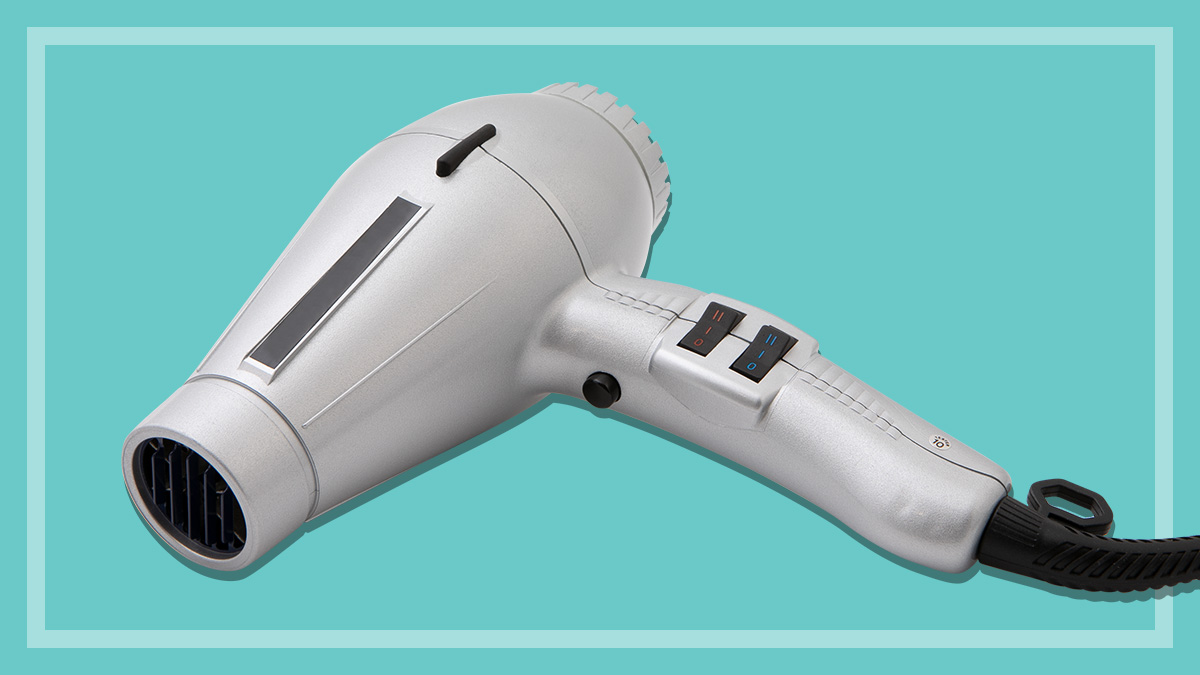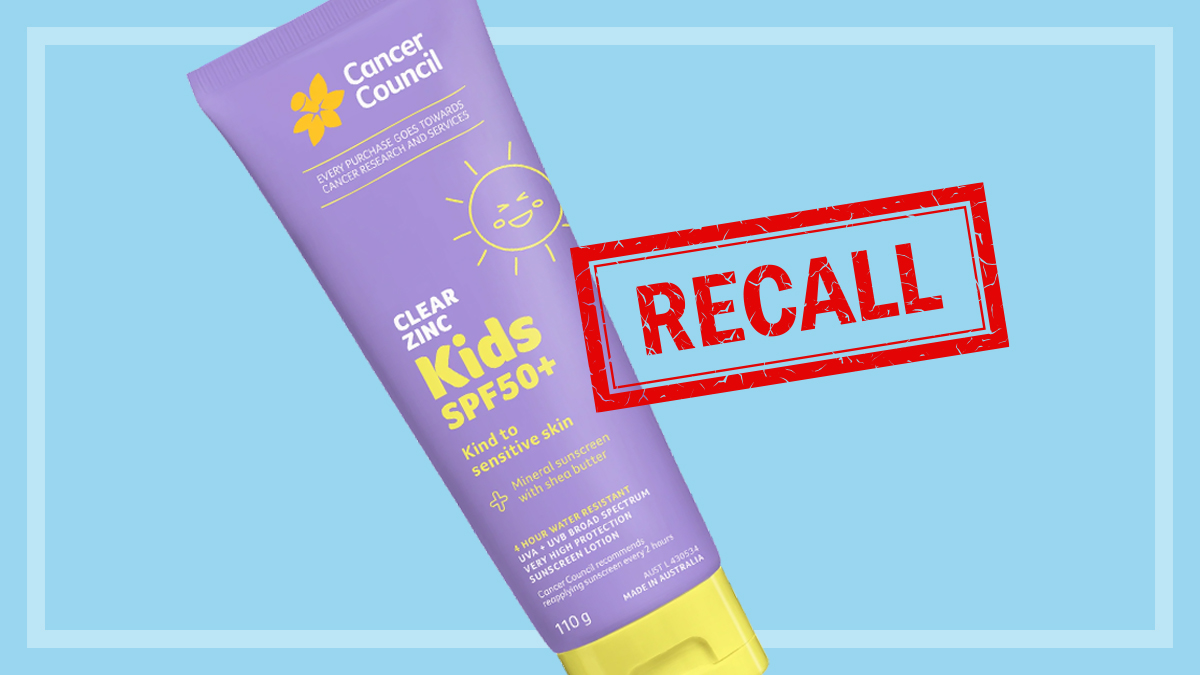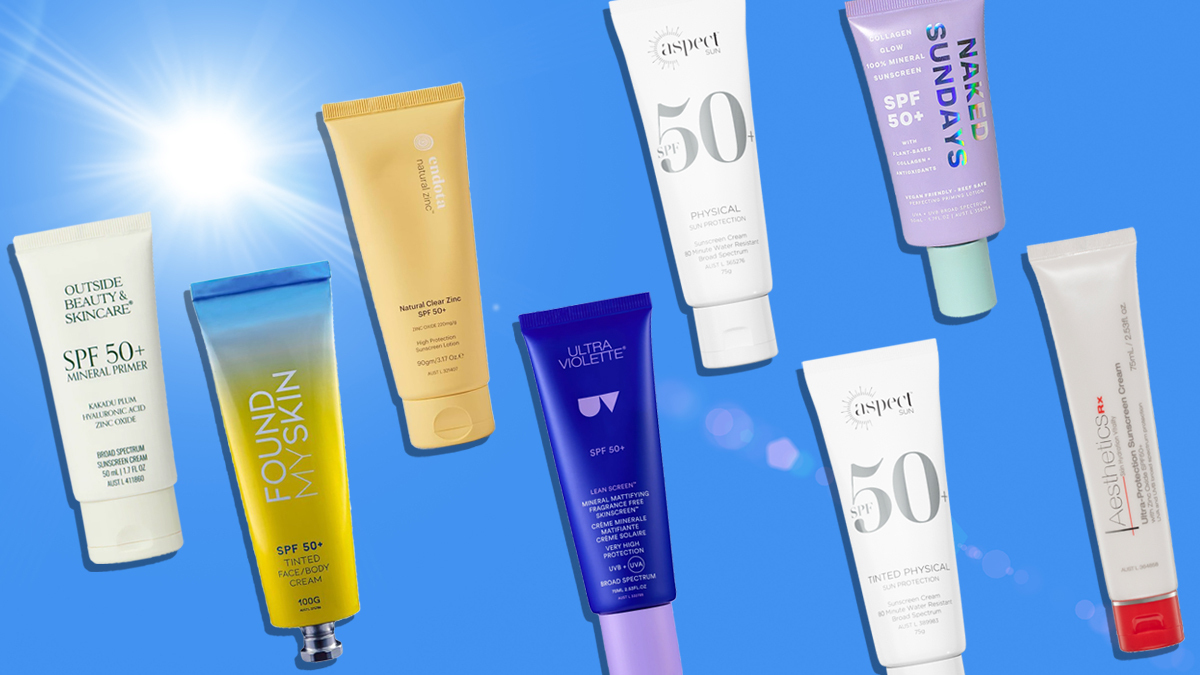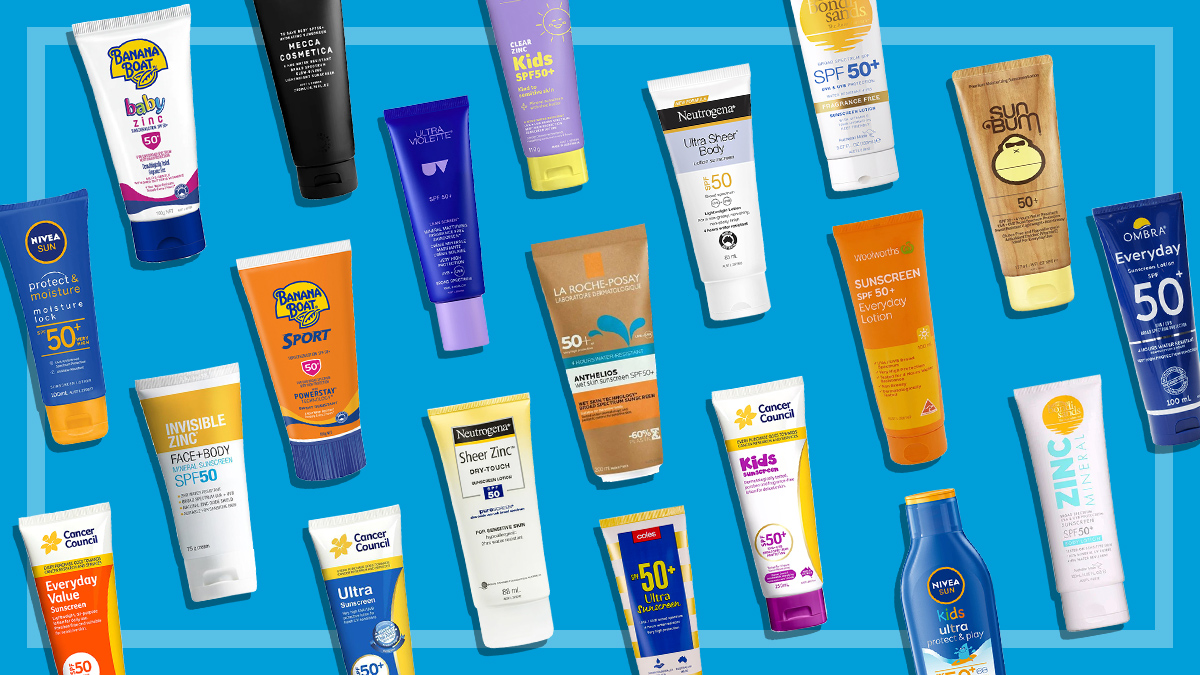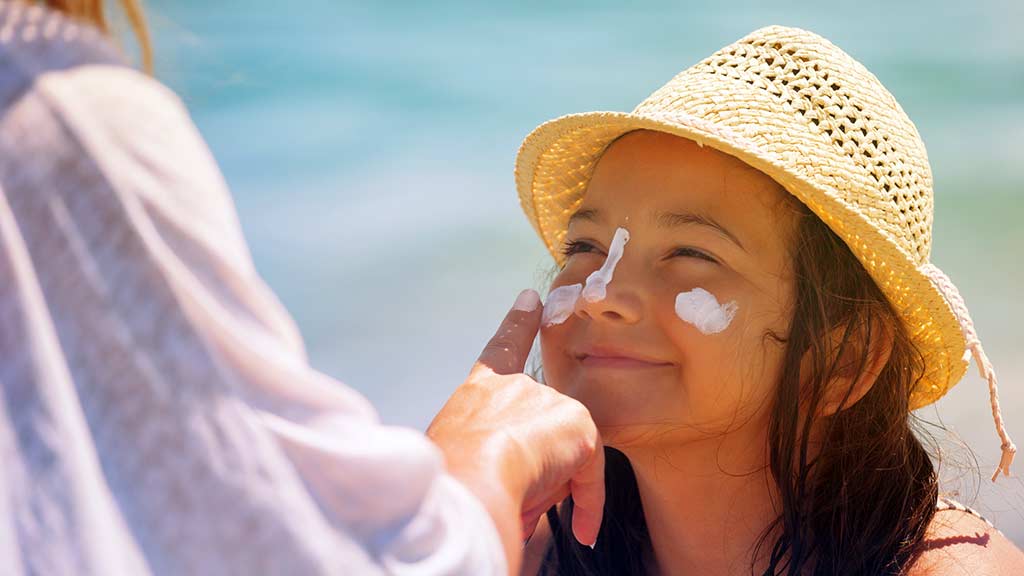Get our independent lab tests, expert reviews and honest advice.
Natural and organic cosmetics
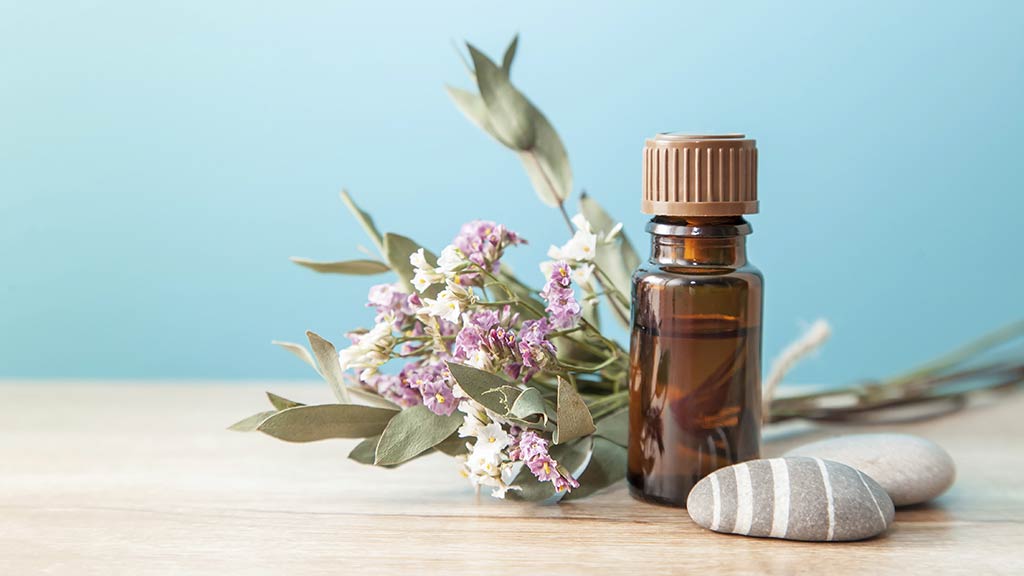
Sales of natural and organic cosmetics and personal care products are burgeoning, with consumers perceiving them as better or safer than regular cosmetics, and therefore prepared to pay a premium for them. With numerous natural and organic certifiers to uphold the standards that consumers can expect from such products, they can get some reassurance they’re getting what they’re paying for. Then there are those products with ‘natural’ or ‘organic’ pretensions that wouldn’t meet even the most lenient of standards.
On this page:
- Standards and certification
- On the shelves
- Is 'natural' safer and gentler?
- Are chemicals in cosmetics really that bad?
In this article we show you how to pick the genuine products, highlight some tricks and traps, and consider whether natural or organic cosmetics are actually any better than their “chemical” counterparts.
Standards and certification
Your best bet for finding natural or organic cosmetics is to look for certification. There are many different certifiers in the market place – here are some of the main ones you’ll find in Australia:
COSMOS
COSMOS is an international standard for organic and natural cosmetics. Founded in 2010 as a collaboration between five European organic certification bodies, it’s now global. As a relatively new standard, the logo isn’t widely seen at the moment – many companies still use the logo of the original certifier – but it’s likely to become more visible in coming years.
COSMOS Organic:Contains a minimum of 95% certified organic ingredients of biological (plant or animal) origin. Water, salts and minerals can’t be counted as organic, so this calculation is based on the other ingredients, which are mostly plant-based ingredients and animal products.
However, at least 20% of the total product (which includes the water and so on) must be organic, except for mineral makeup products and wash-off products (and others which reasonably have a very high water content) for which the minimum percentage is 10%.
Further requirements are that there are no genetically modified or irradiated ingredients, no nanoparticles and no animal testing. Animal products can be used (such as beeswax or honey), but not parts of dead animals. The packaging also has to meet certain requirements.
COSMOS Natural:The standard for natural ingredients stipulates which ingredients are permitted and how they may be processed. The product doesn’t have to be 100% natural – instead the percentage of “natural” ingredients is listed, and can include water, salts and minerals.
Australian Certified Organic
Australian Certified Organic has two certification categories for organic cosmetics:
- Certified organic: Contains a minimum of 95% certified organic ingredients (excluding salt and water) and up to 5% consisting of other approved ingredients.
- Made with certified organic ingredients: Contains 70–95% certified organic ingredients (excluding salt and water) with the remainder from approved non-organic sources.
Australian Certified Organic also certifies products on behalf of COSMOS, so you may see both logos on some products.
Natrue
Natrue is an international certifier for natural and organic cosmetics and skin care products, with locally based certifiers in various countries. Only water, natural ingredients, derived natural ingredients and nature-identical ingredients are permitted. There are three levels of certification: natural; natural with organic ingredients (70% or more organic ingredients); and organic (95% or more organic ingredients).
NSF
The NSF “contains organic ingredients” standard is a US national standard for personal care products making organic ingredient claims. Products must undergo a thorough review by an independent organic certification organisation to verify the product contains least 70% organic content by weight.
Others
While the above are the main certifiers for the products we came across, other organic certifiers for ingredients and/or the total product include Soil Association (UK), BioGro (NZ), Ecocert (France), OFC, BDIH (Germany), Cosmebio (France), ICEA (Italy), Natural Products Association (US) and USDA Organic (US). You may see one or more of these logos on marketing material and packaging – a company may apply to different organisations for certification according to the markets in which they sell.
On the shelves
A quick look around the shelves of your local pharmacy or supermarket reveals there are plenty of products that appear natural and/or organic, based on their branding, label claims and imagery. But consumers should be wary of claims that a product contains natural or organic ingredients – and of paying a premium price for them – when the ingredient is actually a very small proportion of the final product.
We reckon these products sound a lot more natural than they really are, and many consumers would probably agree:
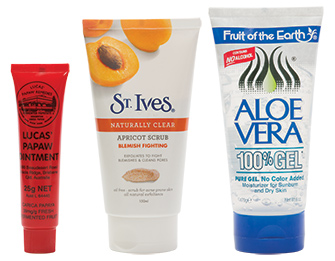
Lucas’ Papaw Ointment is mostly petroleum jelly, and only around 4% pawpaw. St Ives Apricot Scrub: containing, last AND least, apricot extract. Fruit of the Earth Aloe Vera is 100% Gel – but not 100% Aloe Vera gel. It also contains ingredients prohibited in natural standards – and even in some countries!
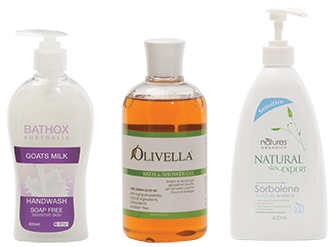
Bathox Goats Milk Handwash contains more salt than goat milk. Olivella Bath & Shower Gel contains “100% virgin olive oil” – apart from all the other ingredients. Natures Organics doesn’t contain any certified organic ingredients.
Here are some products with more robust claims to naturalness.
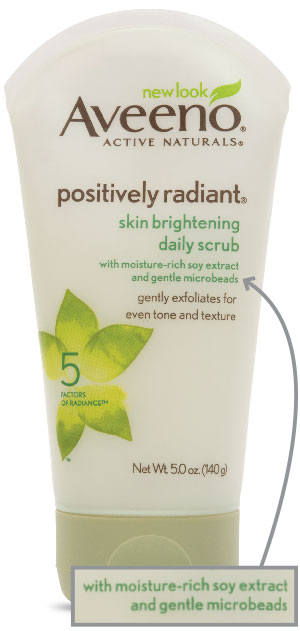
Aveeno Positively Radiant Skin Brightening Daily Scrub
Containing “moisture rich soy extract and gentle microbeads”, the exfoliating microbeads are an environmental problem – and not at all natural. Made from polyethylene, these tiny plastic balls end up in the sewage system and pass through the treatment system filters into the treated waste water stream and into our rivers and oceans. The particles have been found in the gut and tissue of fish and other aquatic animals such as shellfish, with unknown consequences for the animals and people who eat them.
Johnson and Johnson, the distributor of Aveeno, is one of several companies committed to phasing out microbeads from products by 2017.
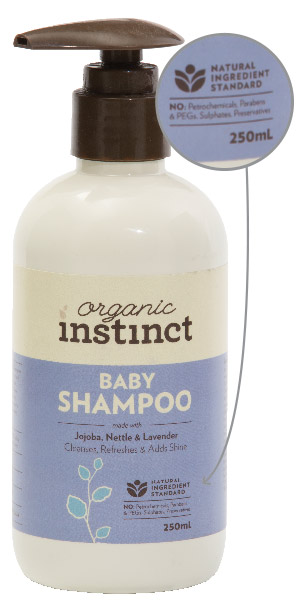
Organic Instinct Baby Shampoo
While there’s no organic certification logo, this does claim to contain certain ingredients with organic certification. (The company has also since changed its name to Natural Instinct.)
The shampoo bears its own ‘Natural Ingredients Standard’ logo, which is described as “our unique method of balancing carefully selected naturally plant derived ingredients while excluding hundreds of potentially harmful chemicals”.
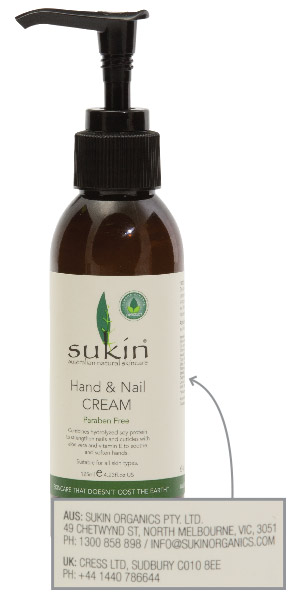
Sukin
Sukin Organics produces personal care products made from plant-based ingredients and excludes many chemicals, such as parabens, SLS, SLES, mineral oil, and propylene glycol. However, with the exception of its rose hip oil, it doesn’t claim any certified organic ingredients.
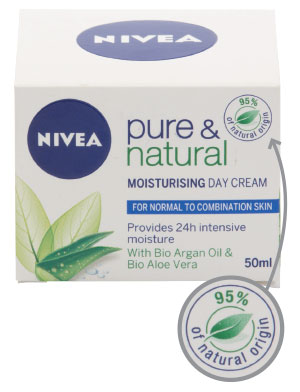
Nivea Pure & Natural Moisturising Day Cream
This moisturising day cream has ingredients that are “95% of natural origin”. Generally speaking, the main ingredients in moisturisers are water, fat, glycerine and alcohol, all of which are readily available from natural sources, so it’s not difficult to achieve 95% natural origin.
“Non-natural” ingredients from petrochemical sources, such as paraffin, mineral oil and petrolatum, are often used in moisturising products for dermatitis and eczema due to their non-irritating nature.
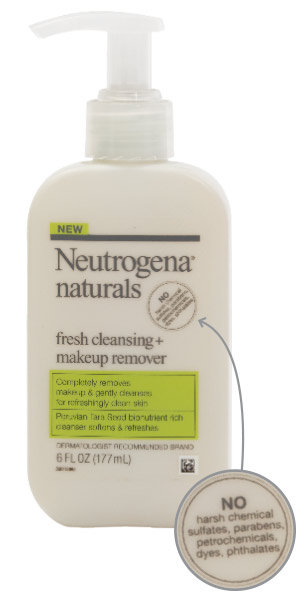
Neutrogena Naturals Fresh Cleansing and Makeup Remover
Some of the ingredients are derived from palm oil, which some shoppers avoid for ethical reasons. Neutrogena is a signatory to the Roundtable on Sustainable Palm Oil, and buys GreenPalm certificates to cover its use in products.
It contains ingredients that sound like synthetic chemicals, but we’re reassured they’re “naturally derived”: so cocamidopropyl betaine is derived from coconuts and guar hydroxypropyltrimonium chloride from guar bean, though petrochemicals are used in processes required to turn the natural ingredient into a cosmetic chemical.
Cocamidopropyl betaine is made by mixing coconut oil with dimethylaminopropylamine (which in turn is made from acrylonitrile, a highly toxic and carcinogenic chemical). Cocamidopropyl betaine was voted Allergen of the Year in 2004 by the American Contact Dermatitis Society (ACDS).
None of this is to suggest these ingredients are bad, and both are permitted ingredients in the COSMOS standard – though guar hydroxypropyltrimonium chloride is permitted in hair products only, not cleansers. But they’re clearly not as ‘natural’ as squeezing coconuts and vegetables into a bottle.
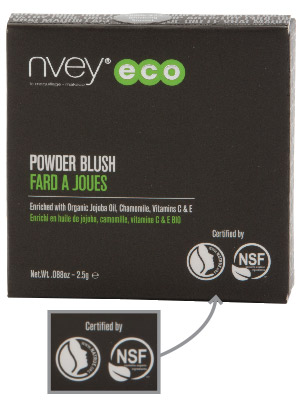
Nvey Eco
Despite being an Australian company making products in Australia, Nvey Eco has chosen to use Natrue and NSF certification because it felt the standards are more stringent, and that this would reflect better on the quality of their products and the ingredients. In addition, because they’re selling mainly overseas, it helps to have internationally recognised certification.

Burt’s Bees
Burt’s Bees Lip Shimmer claims to be ‘100% Natural’, though there is no natural certification logo.
In the past, testing by the US Food and Drug Administration found traces of lead in Burt’s Bees Lip Shimmer products, which raised concerns among natural cosmetics proponents. However, as Burt’s Bees has pointed out, lead is a potential contaminant in the natural mineral sources used for lip colouring, and while the amounts present are too low to present any risk It says it’s continually working to minimise or eliminate lead traces.
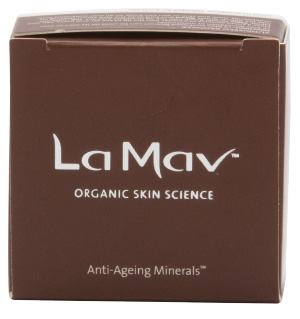
La Mav
La Mav Sunkissed Bronzer contains certified organic ingredients, as well as minerals. The certifier is Organic Food Chain (OFC), though this isn’t mentioned on the packaging. It also states – on its website – that it’s ‘Australian Government Certified’. This just means that OFC is recognised by the Australian Quarantine and Inspection Service as an organic certifier.
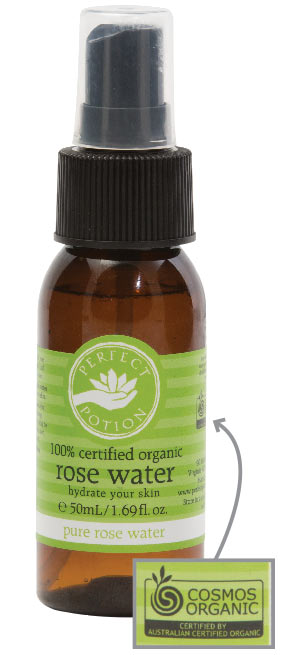
Perfect Potion
Perfect Potion products are certified by COSMOS, but many still carry the logos of Germany’s BDIH – one of the founding COSMOS members – or Australian Certified Organic. The company is currently migrating to COSMOS certification.
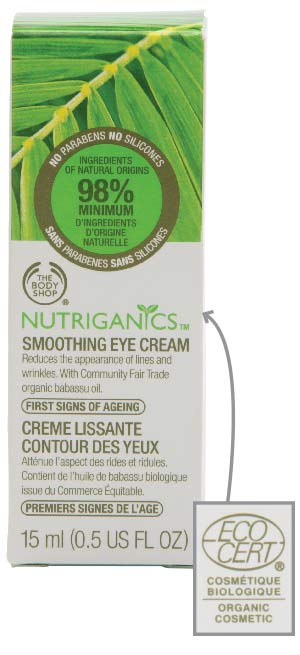
The Body Shop Nutriganics
The Body Shop was the original fair-trade, no animal testing, eco-conscious mainstream brand, with its fruity and flowery fragrances packing a natural punch since 1976. It has recently come to the natural certification party, with its organic range, Nutriganics, certified by Ecocert.
Is ‘natural’ safer and gentler?
Some people are drawn to natural cosmetics because they have sensitive skin, or suffer reactions to certain ingredients. Fragrances and preservatives are the main culprits and if you know particular chemicals cause you problems, it makes sense to avoid them. But natural cosmetics may not always be a better choice. For example:
- Many natural ingredients can cause skin reactions and allergies, including lavender, tea tree oil, lanolin, cinnamon (and derivatives), and various essential oils.
- Citrus oils are among those that sensitise skin to sun damage, causing redness, swelling and blisters.
- Personal care products containing lavender and tea tree oils have been linked with hormone disruption in boys.
Alarmingly, people can develop food allergies after being sensitised to ingredients found in cosmetics. There have been reports of people who’ve developed food allergies to goat milk and cheese after using goat milk soap or moisturiser on their skin. Other reports have linked food allergies to skin care products containing almond oil, peanut, wheat and oats.
Professor Robyn O’Hehir, director of the Alfred Hospital’s Department of Allergy, Immunology & Respiratory Medicine, tell us it’s mainly a concern for certain people with a predisposition to allergies, especially if the skin is broken or inflamed due to eczema, and she recommends that these people avoid products containing food allergens.
“While unlikely to be a problem for most people, with intact skin providing an effective barrier to the underlying immune system, application of these ‘natural’ products containing food allergens to eczematous skin may lead to a severe allergic reaction when the food is eaten subsequently.”
Another major concern about natural cosmetics is microbial contamination and spoilage. Case in point: in 2013 the ACCC recalled three ‘natural’ cosmetic products due to microbial contamination. While there are some natural preservatives, certification standards for natural and organic cosmetics often allow for certain ‘safe’ synthetic preservatives to be used.
As Burt’s Bees notes, “Preservation of natural formulas is challenging and we’ve found that natural preservatives simply aren’t effective in some formulas. To ensure the safety, efficacy, and aesthetic of our formulas, we use the synthetic preservative phenoxyethanol at 1% or below in some of our water-containing products”.
At the very least, take note of any storage or use-by instructions provided. Bryan Barron, content and research director at the research-based cosmetics review site Paula’s Choice, says, “Natural products, whether certified organic or not, absolutely have a shorter shelf life compared to regular cosmetics. They should be treated more carefully, and some brands require refrigeration or very small sizes to avoid premature spoilage”.
Are chemicals in cosmetics really that bad?
When it comes to cosmetics ingredients, there are clearly degrees of ‘naturalness’, with many natural ingredients undergoing some form of processing. Even the feared petroleum-based ingredients come from a source that was once ‘natural’ and, as any chemist will confirm, ‘organic’!
As Bryan Barron points out, “The word ‘chemicals‘ tends to have a fearful, negative connotation among consumers but in truth, everything around us is composed of chemicals. Just like there are good and bad natural and synthetic ingredients, there are good and bad chemicals.
“There are lots of great natural ingredients just as there are lots of great synthetic ingredients – the best products utilise both to the consumer’s advantage!”

